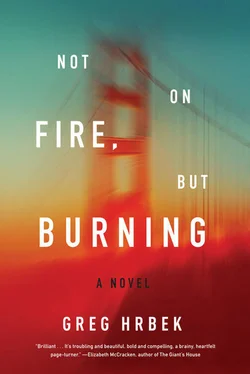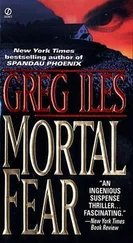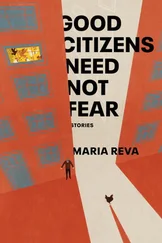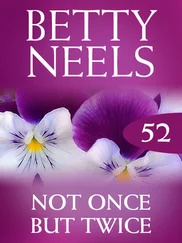Think.
What were you just feeling? That the food tastes delicious. That it’s nice to know what your friends are eating, too. But this, these brown balls of chocolate, this isn’t food. And the names and pictures on the screen … It seems a hole has opened up in him and his heart is falling into it. This is not food. Food is the flatbread and honey the sheikh would bring you at night after a day of eating next to nothing — and a friend is someone you ate alongside, with whom you ate flatbread soaked in honey while sitting on a hunk of blasted concrete under a slivered moon while saliva dripped dog-like from your tongues — and a father, a father is not a man with a swimming pool; a father is a man you find in the shadow of a pillar of black smoke after the remote-controlled plane has passed out of sight, skin of his face studded with shrapnel of glass and a dagger of glass set in the neck.
Staring now out of the sliding glass door of this kitchen he is in. Beyond which can be seen a swimming pool and a reflection of morning sun on the dome that covers the pool and strange insects posed here and there on the dome. He signs off from Lifebook. Touches the phone app. He does not have to try to remember the numbers, which a part of his mind has been reciting constantly ever since the learning of them; merely has to touch the symbols on the screen, which correspond to the sounds of the words. One: 1. Five: 5. Three: 3. Nine: 9. Karim is not at all unsure about the next digit. But he sits motionless as if the message has strayed from the path between brain and hand. Four numbers typed, but not a fifth … In the camp, there had been no confusion, no paradox. It all made easy sense. Your family is gone (the sheikh had told them) and you have nothing left on Earth. But if you leave this Earth as a shahid, as a martyr for the sake of Allah: Boys, if you do this, you will have everything … But now. What is he afraid of now? What is he not afraid of? He is afraid of: the sheikh, the ten numbers, what will begin if he makes the call, what will happen to him if he doesn’t, the man he calls jaddi seeing him now talking on the phone, the will of God, defying the will of God, seeing the light shining from the face of God in Paradise, the chance that there is no such thing as Paradise, the belt with its tubes of nitroglycerin and concentrations of nails and screws, the button on the belt, to die, to cause others to die, to live instead of dying, to live forever instead of living … These thoughts moving through his mind simultaneously like nails and screws propelled outward in all directions by an explosive charge in a half-moment hardly known before its passing — while beyond the glass door there is not only the pool, but also, nearer to the door, a bird feeder, a little house on a pole where a bird with brilliant red feathers is perched and pecking at the seed; and now another flying into sight to land alongside the first, same kind though gray with a red beak; and then, suddenly, though much later, the birds are gone and the old guy is opening the door. He’s got a jar. Not honey, fudge sauce. Holding it up like a trophy newly won until he really sees the boy at the table.
“Karim, what—”
“Nothing.”
“Damn. Damnit, son.” Then, in Arabic: “I’m sorry.” He sits at the table. “I shouldn’t have left you alone like that.”
“Jaddi …”
“Go ahead,” he says. “Let it out.” (Leaning forward, old hands clasping and unclasping but not daring to touch your hands, which are also on the table, closed around the phone.) “I’m here,” the old guy says. (Not understanding at all.) “I’m here,” he says. “Damn, I’m sorry, son. I won’t do that again. I mean, not until—” (not understanding, not understanding at all) “—not until you’re ready …”
Keenan gave Mr. B some bullshit about a family crisis: Grandma fractured her femur in a loony bin for the memory-impaired. Dean’s excuse was some Calypso Fest at the Civic Center. Come eleven o’clock, it was just me and Plaxico in our cargo trunks and sun-protective shirts and flip-flops heading up the curve of the cul-de-sac. To the party. If you could call it a party: three kids, one of whom was literally an enemy combatant, and a retired mercenary. Then a car rolled by us. Two kids in the back. It slowed down at The Negro, which is when I saw that another car was already parked in the driveway, and there was a woman in a head scarf standing by the open driver’s door and a kid was walking from that car to the house. Dressed just like us. Dressed for swimming.
“What is this,” I said.
“I dunno.”
“Other kids. And they’re hajis.”
“Yep,” Plaxico said.
“Who are they? From Crescent?”
“Crescent, I bet.”
Which was a private school in an old crumbling mansion near the abandoned racetrack. We had Muslim kids at our school. But if they could afford it, Muslims sent their kids to Crescent.
“Forget it,” I said.
My best friend had a look on his face like maybe he agreed. We just stood there for a few seconds while our sunscreen scattered and absorbed ultraviolet radiation. Hottest day of summer so far. Meanwhile, Mr. Nkondo was coming down his driveway with a garden hose. Washing dead cicadas off the blacktop. Now he closed down the nozzle and I could feel the water wanting to get out.
“Zeb, Dorian. Yo.”
“Hi, Mr. N.”
He removed his kente hat, ran his wet hand through his wooly hair, and looked at the scene playing out next door. The lady in the head scarf talking to the driver of the car that had passed us; the kids. All of them definitely Arabic.
“Lemme guess. You two are going to a funeral on a beach.”
“Pool party,” Plaxico said.
Mr. N put the hat back on. “You know those kids?”
We shook our heads.
“Well,” Plaxico said. “We know Karim.”
“Not really,” I said.
“We met him the other day.”
“Me, too,” Mr. N said. “I met him the other day. Can’t say it was love at first sight. The kid’s kind of, I don’t know.”
“Yeah,” I said.
“So you got that feeling, too,” he said. “Well, let’s not rush to judgment. He’s been through a lot.”
“Do you think it was a drone?” Plaxico asked.
“What.”
“That killed his family.”
Mr. N raised the leaking hose to his lips. “You mean, do I think our government has been in the business of killing its own citizens … I— Well, I need some proof before I buy into that story.”
“Me, too,” I said.
“Whatever happened, it left him all alone. I was talking to Ry — Ryder’s in Damascus now — and he said, over there, kids who lose everything, they wind up blowing themselves into a million pieces.”
“How can kids do that.”
“I don’t know, Zeb. So maybe it’s all good. Help a kid, save some innocent lives. Maybe that’s how we get out of this mess. A few lives at a time.”
As we walked off, I was thinking about how Mr. N had been an orphan, too. From Nigeria. An American couple adopted him when he was a baby. Growing up, he had been Hendrix Woodworth. Later, he took back his African name. Went to college, got married, had a kid of his own.
Made me wonder.
What if no one had ever helped Mr. N.
As Moses Nkondo opens the nozzle of the garden hose (the water has been surging there like blood behind a clot and now released atomizes against the blacktop, alchemizing into a rainbow-flecked spray), he watches the two boys walk toward the neighboring house. They have, he has noticed, a curious habit of touching the lawn jockey statue every time they go near it. The statue has been there at the foot of that driveway for as long as he can remember. A representation undebatably offensive. The big red lips and the skin not so much black as blackfaced. But one school year, Ryder did a report and discovered that the statues had been used to guide escaped slaves to freedom; and ever since then, he has felt a fondness for the thing, not because of its history, but because of the association with his son, who when he wrote that report was as small and bewildered as the boys seen now through this veil of water … He washes the insect death, the exoskeletons and winged bodies, to the foot of the driveway and into the road. Doing this with one hand while manipulating the screen of his smartphone with the other. Checking the countdown timer that tracks the balance of his son’s tour of duty. Six months, five days, thirteen hours, twelve minutes, forty-one seconds, forty, thirty-nine …
Читать дальше












